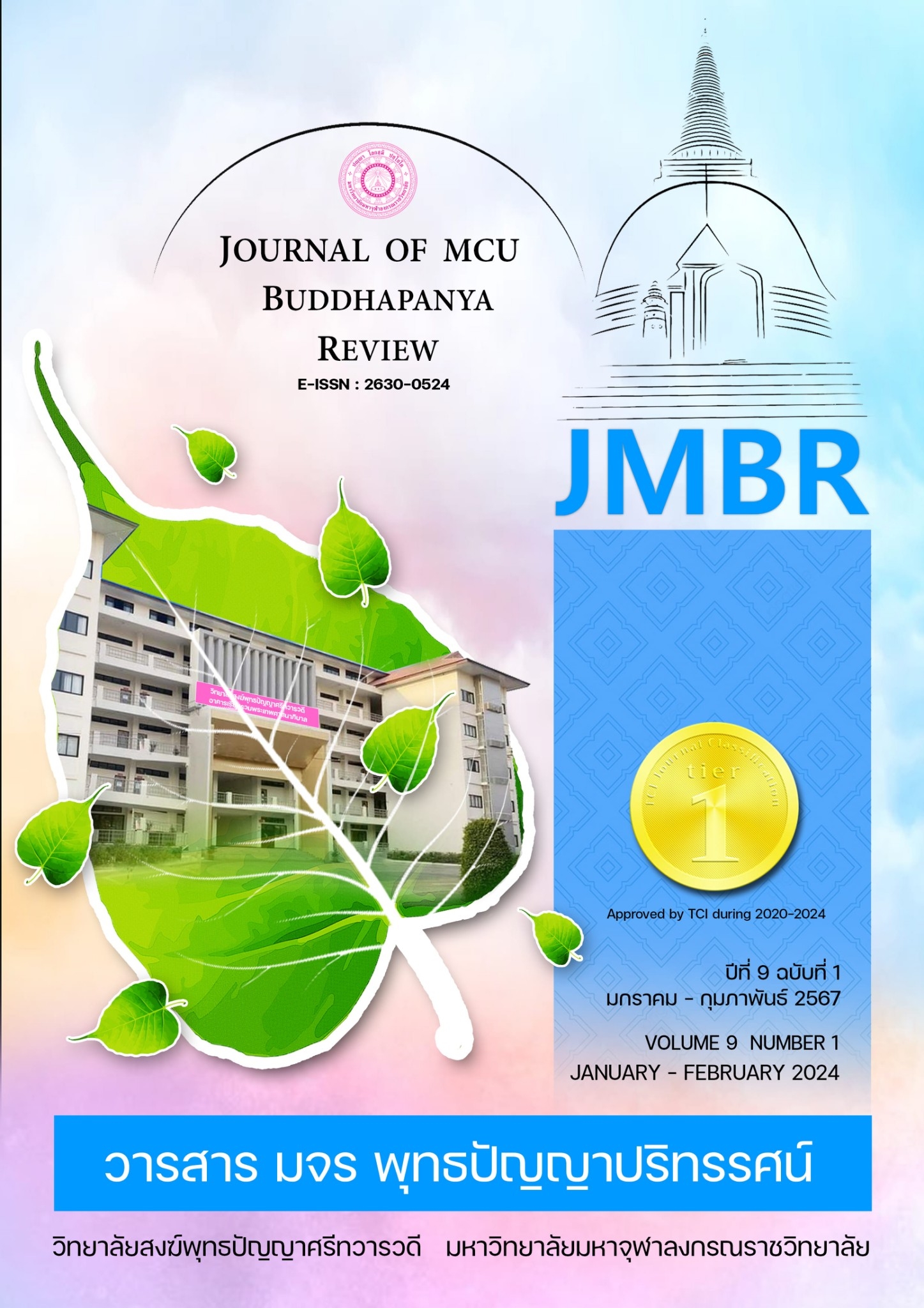การจัดการการท่องเที่ยวโดยชุมชน OTOP นวัตวิถีเพื่อการพัฒนาชุมชนอย่างยั่งยืน
คำสำคัญ:
การจัดการการท่องเที่ยวโดยชุมชน, การพัฒนาชุมชนอย่างยั่งยืน, ชุมชนท่องเที่ยว OTOP นวัตวิถี, ชุมชนท่องเที่ยว OTOทุนวัฒนธรรม, การมีส่วนร่วมของชุมชนบทคัดย่อ
การจัดการการท่องเที่ยวโดยชุมชน OTOP นวัตวิถีเพื่อการพัฒนาชุมชนอย่างยั่งยืน มีวัตถุประสงค์ในการทำวิจัยครั้งนี้ คือ 1. เพื่อศึกษาการจัดการการท่องเที่ยวโดยชุมชน OTOP นวัตวิถีที่มีอิทธิพลต่อการพัฒนาชุมชนอย่างยั่งยืน 2. เพื่อศึกษาการจัดการการท่องเที่ยวโดยชุมชน OTOP นวัตวิถีที่มีอิทธิพลต่อการพัฒนาชุมชนอย่างยั่งยืนผ่านการมีส่วนร่วมของชุมชน 3. เพื่อศึกษาการจัดการการท่องเที่ยวโดยชุมชน OTOP นวัตวิถีที่มีอิทธิพลต่อการพัฒนาชุมชนอย่างยั่งยืนผ่านทุนวัฒนธรรม โดยผู้วิจัยได้กำหนดแนวทางการวิจัยเชิงปริมาณ (Quantitative Research) ซึ่งใช้แบบสอบถามในการเก็บข้อมูล กลุ่มตัวอย่างของงานวิจัยเล่มนี้ คือตัวแทนชุมชนท่องเที่ยว OTOP นวัตวิถี (ประธาน/รองประธานชุมชน) จำนวน 400 ชุมชนทั่วประเทศ โดยผู้วิจัยแบ่งกลุ่มตัวอย่างตามศักยภาพของชุมชน สามารถแบ่งชุมชนท่องเที่ยว OTOP นวัตวิถีออกเป็น 4 กลุ่ม ได้แก่ 1.ชุมชนท่องเที่ยวดาวเด่น (Attractive: A) 2.ชุมชนท่องเที่ยวดาวรุ่ง (Brighten: B) 3.ชุมชนโดดเด่นเฉพาะด้าน (Case Study: C) 4.ชุมชนสินค้า OTOP (Delivery Products: D)
ผลการวิจัยตามวัตถุประสงค์การวิจัย พบว่า 1.การจัดการการท่องเที่ยวโดยชุมชน OTOP นวัตวิถีมีอิทธิพลต่อการพัฒนาชุมชนอย่างยั่งยืนอย่าง อย่างมีนัยสำคัญ โดยมีค่าพยากรณ์ร้อยละ 58.80 2.การมีส่วนร่วมของชุมชน เป็นตัวแปรกลางแบบบางส่วนของการจัดการการท่องเที่ยวโดยชุมชน OTOP นวัตวิถีมีอิทธิพลต่อการพัฒนาชุมชนอย่างยั่งยืน 3.ทุนวัฒนธรรม เป็นตัวแปรกลางแบบบางส่วนของการจัดการการท่องเที่ยวโดยชุมชน OTOP นวัตวิถีที่มีอิทธิพลต่อการพัฒนาชุมชนอย่างยั่งยืน องค์ความรู้ที่ได้จากงานวิจัยนี้ทำให้ชุมชนท่องเที่ยว OTOP นวัตวิถีเห็นถึงความสำคัญของทรัยากรที่มีอยู่ในชุมชนและการมีส่วนร่วมของชุมชนจะช่วยพัฒนาชุมชนอย่างยั่งยืนได้
เอกสารอ้างอิง
Chantnamchu, N. (2017). Tourism Model and Routes for Creative Learning in Kanchanaburi. Journal of Education, Silpakorn University. 15(1): 51-64
Chinnaphong, P. (2017). The Study of Sustainable Tourism Models that Effect The Development of Cultural Attractions’ Quality Standards in Central Province. Journal of Graduate Studies Valaya Alongkron Rajabhat University. 11(2): 100-114
Chon Bunnak et al., (2018). Research Coordination for SDGs. (Research Report). Thailand Science Research and Innovation
Chuenpraphanuson, T. (2013). Training Course Development: Talented Youth Volunteerstourist Kalasin Municipality Kalasin Province (Research report of the Faculty of Humanities and Social Sciences). Suan Dusit Rajabhat University, Bangkok
Community Development Department. (2018). Additional expenditures for OTOP Nawatwithi Community Projects. TS 0404.3/W1132.
Community Development Department. (2020). OTOP Nawatwithi Tourism Community Project. Retrieved from https://www.cdd.go.th/Department of Cultural Promotion. (2019).
Hongsuwan, P.and Chantrun, N. (2017). The Isan Weaving Village Management for Development Cultural Tourist Route Links Khon Kaen Province and Mahasarakham Province (Research Report). Thailand Science Research and Innovation
Kaewsanga, K. and Chamnongsri ,N. (2015). Knowledge Management of Creative Tourism in Cultural Tourist Attractions, Phimai District, Nakon Ratchasima. Suranaree Technology Journal. 9(2): 79-103
Keyuraphan, L., et al. (2018). A Study Thai Lao Krung Culture to Promote Creative Learning in U-Thing Suphanburi Province. Journal of Education Silpakorn University. 13(1): 163-174
Leepanyaporn, N. (2020). The Study of Lao Khrang Ethnic Culture Capital in The Dimension of Culture Tourism to Raise The Economy of Ban Thung Si Long Community, Don Tum District, Nakhin Pathom. (Master of Arts). Silpakorn University, Nakhon Pathom
Luengthongkham, S. and Wongmontha, S. (2015). Community participation in the development of traditional tourism. Sustainability: A Case Study of Pranburi District Prachuap Khiri Khan Province. Suan Dusit Graduate School Academic Journal. 11(1): 19-29
Maneerot, N.. (2017). Community-Based Tourism Management. International Thai Tourism Journal. 13(2): 25-46
Ngampraphasom, P. (2016). A Study of Factors Effecting Tourist Place Management by The Community, A Case Study of The Tourist Place Management of Ban Moh Luang, Mae Moh District, Lampang. Journal of Humanities and Social Science. 8(16): 78-87
Pawabutra, L. (2012). Participation of Communitices in Managing Child Development Center, San Pu Loei Municipality, Doi Saket District, Chiang Mai Province. (Master of Education). Chiang Mai University, Chiang Mai
Pongtratik, C., Nimnatipun, S. and Malarat, A., (2021). The Development of Culture Tourism Strategies in Prachuap Khiri Khan Province. Journal of MCU Buddhapanya Review. 6(3): 77-91
Pornnaum, P. (2001). Faith in The Principle of Educational Participation of School Administrators Attached to The Office of Mae Tha District Primary Education, Lamphun Province. (Master of Education). Chiang Mai University, Chiang Mai
Somsila, K. and Kaewnuch. K. (2018). Participative Factors Affecting Community Based Tourism Management: A Case Study of Kham Muang, Kalasin Province. Dusit Thani College Journal, 12(1): 103-123.
Songthip. K. (2014). People’s Participant in Conversation Tourism Management: A Case Study of Wat Takien Floating Market, Bangkruay District, Nonthaburi Provice. (Master of Arts). Dhurakij Pundit University, Nonthaburi.
Sudarat Rattanapong, Nungruthai Srisuksai, Krittima Intagoon} Chuthatip Pradipatnaruemon and Nanthaphan Kodkong. (2021). Community based Tourism Management in Wang Thong Subdistrict, Wan Thong District, Pirsanulok Province. Journal of MCU Buddhapanya Review. 6(1): 35-46
Sukbanjong, C., (2016). Sustainable Tourism Development of Nhanmoddang Rafting, Pa Phayom District, Phatthalung Province. (Master of Arts). Bangkok University, Bangkok.
The Sustainable in Nakhonrachasime. Journal of Humanities and Social Sciences Valaya Alongkorn. 12(3): 141-154.
Value-to-value culture. Retrieved from http://www.culture.go.th/culture_th/ ewt_news.php?nid =3972&filename=indexJanejeera Aksornpim. (2017). Strategy Management of Community-Based Tourism Towards
Wanlop Wannaosote. (2021). OTOP Nawatwithi Community-Based Tourism Management Model for Sustainable Community Development. (Doctor of Philosophy). Silpakorn University, Nakhon Pathom
ดาวน์โหลด
เผยแพร่แล้ว
รูปแบบการอ้างอิง
ฉบับ
ประเภทบทความ
สัญญาอนุญาต
ลิขสิทธิ์ (c) 2024 วารสาร มจร พุทธปัญญาปริทรรศน์

อนุญาตภายใต้เงื่อนไข Creative Commons Attribution-NonCommercial-NoDerivatives 4.0 International License.



